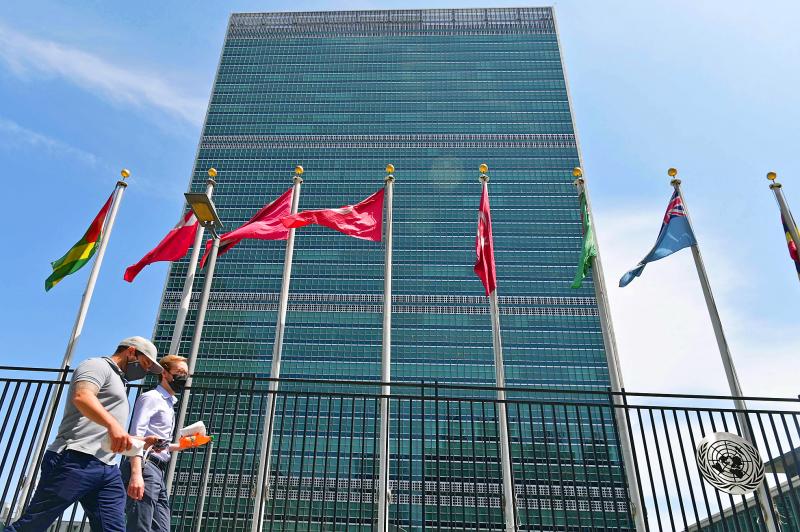Beijing has inaccurately interpreted a UN resolution adopted in 1971 to exclude Taiwan from the international organization and its affiliates, a US Department of State official said on Thursday.
“The People’s Republic of China [PRC] has misused Resolution 2758 to prevent Taiwan’s meaningful participation,” said Rick Waters, deputy assistant secretary of state in the department’s Bureau of East Asia and Pacific Affairs, during a virtual talk hosted by the Washington-based German Marshall Fund.
Waters said that Taiwan’s exclusion from UN activities “creates an immense cost” to the nation, as well as the bloc’s members, adding that “Beijing is denying the international community the ability to gain valuable contributions that Taiwan offers.”

Photo: AFP
In the resolution adopted on Oct. 25, 1971, the UN General Assembly decided to “expel forthwith the representatives of Chiang Kai-shek (蔣介石) from the place which they unlawfully occupy at the United Nations and in all the organizations related to it.”
In Taipei, the Ministry of Foreign Affairs thanked the US for firmly supporting Taiwan’s bid to join UN organizations.
“The Republic of China is a democratic country with independent sovereignty,” the ministry said in a statement, adding that the nation and the PRC are not subordinate to each other.
Only an elected government in Taiwan can represent its 23.5 million people on international occasions, including the UN, the ministry said.
The resolution only addressed the PRC’s representation in the UN without authorizing it to represent Taiwan, nor did it mention that Taiwan is part of the PRC, it said.
The PRC has been intentionally abusing the resolution to pressure the UN into excluding Taiwanese from its system, it added.
The ministry denounced Beijing prioritizing its political maneuvers over the interests of global cooperation, while calling on international society to face China’s “overt plot” against Taiwan.
The government would continue to bolster its cooperation with the US and other like-minded countries to expand Taiwan’s international space, and defend the shared values of democracy, freedom and a rules-based international order, the ministry said.
Democratic Progressive Party Legislator Lo Chih-cheng (羅致政) said that support from a high-ranking US official would benefit Taiwan’s UN bid, either in terms of aiding its appeal or gaining the moral high ground.
Chinese Nationalist Party (KMT) Legislator Charles Chen (陳以信) said that under former president Ma Ying-jeou’s (馬英九) administration, Taiwan participated as an observer at the World Health Assembly — the WHO’s decisionmaking body — for eight years.
It shows the nation could make a breakthrough by endorsing the so-called “1992 consensus,” he said, adding that rejoining the UN under the name the Republic of China should be a priority.
The “1992 consensus” — a term that former Mainland Affairs Council chairman Su Chi (蘇起) in 2006 admitted making up in 2000 — refers to a tacit understanding between the KMT and the Chinese government that both sides of the Taiwan Strait acknowledge there is “one China,” with each side having its own interpretation of what “China” means.

The US government has signed defense cooperation agreements with Japan and the Philippines to boost the deterrence capabilities of countries in the first island chain, a report by the National Security Bureau (NSB) showed. The main countries on the first island chain include the two nations and Taiwan. The bureau is to present the report at a meeting of the legislature’s Foreign Affairs and National Defense Committee tomorrow. The US military has deployed Typhon missile systems to Japan’s Yamaguchi Prefecture and Zambales province in the Philippines during their joint military exercises. It has also installed NMESIS anti-ship systems in Japan’s Okinawa

‘WIN-WIN’: The Philippines, and central and eastern European countries are important potential drone cooperation partners, Minister of Foreign Affairs Lin Chia-lung said Minister of Foreign Affairs Lin Chia-lung (林佳龍) in an interview published yesterday confirmed that there are joint ventures between Taiwan and Poland in the drone industry. Lin made the remark in an exclusive interview with the Chinese-language Liberty Times (the Taipei Times’ sister paper). The government-backed Taiwan Excellence Drone International Business Opportunities Alliance and the Polish Chamber of Unmanned Systems on Wednesday last week signed a memorandum of understanding in Poland to develop a “non-China” supply chain for drones and work together on key technologies. Asked if Taiwan prioritized Poland among central and eastern European countries in drone collaboration, Lin

ON ALERT: Taiwan’s partners would issue warnings if China attempted to use Interpol to target Taiwanese, and the global body has mechanisms to prevent it, an official said China has stationed two to four people specializing in Taiwan affairs at its embassies in several democratic countries to monitor and harass Taiwanese, actions that the host nations would not tolerate, National Security Bureau (NSB) Director-General Tsai Ming-yen (蔡明彥) said yesterday. Tsai made the comments at a meeting of the legislature’s Foreign Affairs and National Defense Committee, which asked him and Minister of National Defense Wellington Koo (顧立雄) to report on potential conflicts in the Taiwan Strait and military preparedness. Democratic Progressive Party (DPP) Legislator Michelle Lin (林楚茵) expressed concern that Beijing has posted personnel from China’s Taiwan Affairs Office to its

BACK TO WORK? Prosecutors said they are considering filing an appeal, while the Hsinchu City Government said it has applied for Ann Kao’s reinstatement as mayor The High Court yesterday found suspended Hsinchu mayor Ann Kao (高虹安) not guilty of embezzling assistant fees, reducing her sentence to six months in prison commutable to a fine from seven years and four months. The verdict acquitted Kao of the corruption charge, but found her guilty of causing a public official to commit document forgery. The High Prosecutors’ Office said it is reviewing the ruling and considering whether to file an appeal. The Taipei District Court in July last year sentenced Kao to seven years and four months in prison, along with a four-year deprivation of civil rights, for contravening the Anti-Corruption